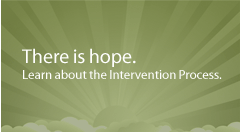


"My gratitude for your help, Bruce, is enormous. Today my son is experiencing the joy of recovery."

The Myth of Hitting Bottom
Many have heard the myth of hitting bottom. It is a belief that people cannot get recovery or clean and sober until they come to a situation where they have lost everything and everyone in their lives before they can get help. This is not only untrue, but unnecessarily harsh. It is true that some people are constitutionally incabable of understanding their illness or doing anything about it, but that number is very few. It is also true that most will die from their addiction either directly or indirectly. What an intervention does is raise the bottom, so to speak.
The best support for anyone involved with substance abuse, either directly or indirectly, is your own. Self care may seem like an overused term, but it is essential for those dealing with addicts. We must remember that we cannot give away what we do not have and that we cannot work harder on someone elses recovery more than they are willing to do themselves. It is our human response to come to the aid of a family member, friend or co-worker. The most difficult part of being in a relationship with an addict is knowing when to stop helping and that doesn't usually happen until after the realization that what we thought was help had somehow turned to enabling. Our help becomes part of the problem by allowing the disease to continue. By keeping the focus on our loved one and off ourselves, we gradually stop taking care of ourselves. Resentments build, we try to force solutions.
An intervention can raise the so-called bottom an addict supposedly must reach before they will get help.
Service Area

Perkins Intervention's main service areas are in Indiana and surrounding states, including Indianapolis, Fort Wayne, Bloomington, LaFayette, or Muncie, IN, Louisville, KY, Cincinnati, OH or Eastern IL or Southern Michigan. Occasionally, there is a need to travel to one coast or the other, particularly Florida. If Bruce cannot travel or is already booked for the time you want, he can and does recommend other intervention specialists.
Recent Articles
Characteristics of Addiction
Alcoholism and drug addiction do not have a single cause and there are several genetic...The Myth of Hitting Bottom
Many have heard the myth of hitting bottom. It is a belief that people cannot get...Intervention
"Intervention is your way to say "We love you," Perkins said...
